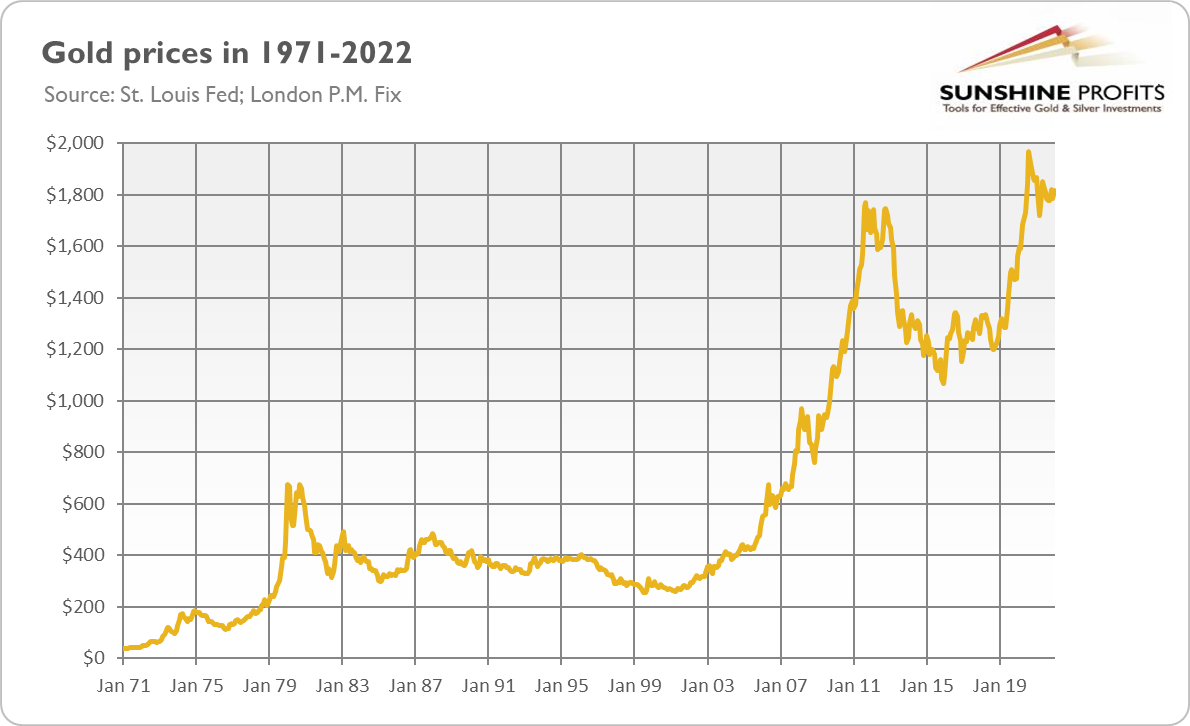Imagine all the people… living life in the Metaverse. Once we immerse ourselves in the digital sphere, gold may go out of fashion. Or maybe not?
 Bullion.Directory precious metals analysis 25 March, 2022
Bullion.Directory precious metals analysis 25 March, 2022
By Arkadiusz Sieroń, PhD
Lead Economist and Overview Editor at Sunshine Profits
If you still have no idea what I’m talking about, you can watch this educational video or just Spielberg’s Ready Player One.
The idea of personalities being uploaded online is an intriguing concept, isn’t it? In this vision, people meet with others, play, and simply hang out in a digital world. Imagine friends turning group chats on Messenger or WhatsApp into group meetups in the Metaverse of family gatherings in virtual homes. Ultimately, people will probably be doing pretty much everything there, except eating, sleeping, and using the restroom.
Sounds scary? For people in their 30s and older who were fascinated by The Matrix, it does. However, this is really happening. The augmented reality technology market is expected to grow from $47 billion in 2019 to $1.5 trillion in 2030, mainly thanks to the development of the Metaverse. China’s virtual goods and services market is expected to be worth almost $250 billion this year and $370 billion in the next four years.
In a sense, it had to happen as the next phase of the digital revolution. You see, we now experience much of life on the two-dimensional screens of our laptops and smartphones. The Metaverse moves us from a flat and boring 2D to a 3D virtual universe, where we can visualize and experience things with a more natural user interface. Let’s take shopping as an example. Instead of purchasing items on Amazon, customers could enter a virtual shop, see and touch all products in 3D, and buy whatever they wanted (actually, Walmart launched its own 3D shopping experience in 2018).
OK, we get the idea, but why does Metaverse matter, putting aside sociological or philosophical issues related to transferring our minds into the digital world? Well, it might strongly affect every aspect of business and life, just as the internet did earlier. Here are a couple of examples. Famous brands, like Dolce & Gabbana, are designing clothes and jewelry for the digital world. Some artists are giving concerts in virtual reality. You could also visit some museums virtually, and instead of taking a business trip, you can digitally teleport to remote locations to meet with your co-workers’ avatars.
Finally, what does the Metaverse imply for the gold market? Well, it’s difficult to grasp all the possible implications right now. However, the main threat is clear: as people immerse deeper and deeper into the digital world, gold could become obsolete for many users. Please note that cryptocurrencies and non-fungible tokens (NFTs) are and will continue to be widely used as payment methods in the Metaverse.
However, there are some caveats here. First, the invention and spread of the internet didn’t sink gold. Actually, the internet enabled gold to be widely traded by investors all over the world. Just take a look at the chart below. Although gold was in a bear market in the 1990s and struggled during the dot-com bubble, it rallied after the bubble burst.

Second, the digital world didn’t kill the analog reality. Despite digital streaming of music, vinyl record sales soared last year, reaching a record high in a few decades. The development of the Metaverse could trigger a similar backlash and a return to tangible goods like gold.
Third, some segments of the Metaverse look like bubbles. Maybe I’m just too old, but why the heck would anybody spend hundreds of thousands, or even millions of dollars to buy items in the virtual world? These items include virtual real estates (CNBC says that sales of real estate in the metaverse topped $500 million last year and could double this year), digital pieces of art or even tweets (yup, the founder of Twitter sold the first tweet ever for just under $3 million)!
It does not make any sense to me, as I can right-click and download a copy of the same digital files (like a PNG file of a grey pet rock) for which people pay thousands and millions of dollars.
Of course, certain items could increase the utility of the game or virtual experience, but my bet is that at least some buyers simply speculate on prices, expecting that they will be able to resell these items to greater fools.
When this digital gold rush ends – and given the Fed’s tightening cycle, it may happen in the not-so-distant future – real gold could laugh last.
Arkadiusz Sieroń


Arkadiusz Sieroń – is a certified Investment Adviser, long-time precious metals market enthusiast, Ph.D. candidate and a free market advocate who believes in the power of peaceful and voluntary cooperation of people.
He is an economist and board member at the Polish Mises Institute think tank, a Laureate of the 6th International Vernon Smith Prize and the author of Sunshine Profits’ bi-weekly Fundamental Gold Report and monthly Gold Market Overview.
This article was originally published here











 Material provided on the Bullion.Directory website is strictly for informational purposes only. The content is developed from sources believed to be providing accurate information. No information on this website is intended as investment, tax or legal advice and must not be relied upon as such. Please consult legal or tax professionals for specific information regarding your individual situation. Precious metals carry risk and investors requiring advice should always consult a properly qualified advisor. Bullion.Directory, it's staff or affiliates do not accept any liability for loss, damages, or loss of profit resulting from readers investment decisions.
Material provided on the Bullion.Directory website is strictly for informational purposes only. The content is developed from sources believed to be providing accurate information. No information on this website is intended as investment, tax or legal advice and must not be relied upon as such. Please consult legal or tax professionals for specific information regarding your individual situation. Precious metals carry risk and investors requiring advice should always consult a properly qualified advisor. Bullion.Directory, it's staff or affiliates do not accept any liability for loss, damages, or loss of profit resulting from readers investment decisions.

Leave a Reply